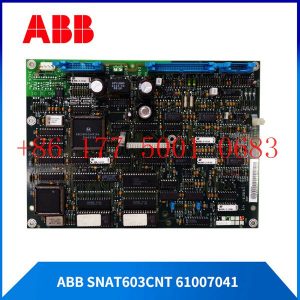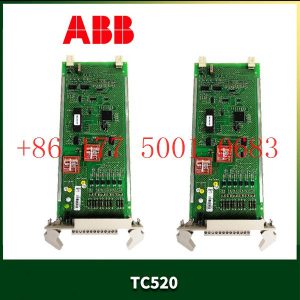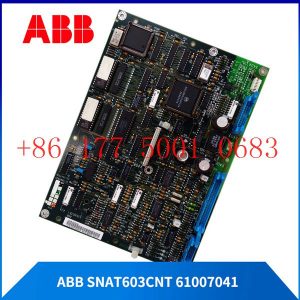Description
GVC736CE101 3BHB045647R0001 Система возбуждения DCS ABB
Why is the industrial Internet inseparable from industrial control?
ABB Global CEO Ulrich Spiesshofer recently accepted an exclusive interview with a reporter from Caijing in New York. He believes that the global manufacturing industry is
undergoing drastic changes. The era of labor arbitrage is over. Labor costs are no longer the focus of competition. The future of manufacturing lies in In factories that are smaller,
closer to consumers, and more agile. Artificial intelligence ( AI ) is the most important technology shaping the future of manufacturing. Currently, AI technology is mainly used in the
consumer field, but its large-scale application in the industrial field and among enterprises is more critical.
Digital transformation has been a keyword for global manufacturing giants in the past two years, and the industrial Internet is the implementation form of digital transformation.
General Electric (GE), Siemens and ABB are all leaders in this regard . Spiesshofer believes that GE”s industrial Internet only collects data and analyzes but cannot control it.
As the world”s two largest industrial automation suppliers, ABB and Siemens have the ability to control equipment, which is a significant difference from GE.
ABB is headquartered in Zurich, Switzerland. Its history can be traced back to the 1880s. It started from the original electrical manufacturing business and has developed into an international manufacturing
giant including electrical products, robotics and motion control, industrial automation and power grid. In 2017, ABB”s revenue was US$34.3 billion, ranking 341st among the
Fortune 500 companies. Spiesshofer has served as CEO for nearly five years since taking office in September 2013.
Below are the details of the interview.
The era of labor arbitrage is over
Caijing: Is 2018 a good year for the manufacturing industry?
Spiesshofer: From a global perspective, GDP is growing and consumption is also growing. Overall positive.
Caijing: What crucial changes are taking place in the manufacturing industry?
Spiesshofer: The jobs of the future will be different from the jobs of the past. In the Middle Ages, craftsmen moved between villages, taking their tools with them to work where
there was demand; later we invented factories, integrated supply and demand, and invented logistics; later people realized that there was labor arbitrage (Labor Arbitrage, Refers to
the existence of moving industries that have lost technological advantages and technical barriers to areas with low labor prices to increase profits by reducing labor costs), so we place
factories in emerging countries to benefit from labor arbitrage.
Now, with the development of modern automation and robotics, we can break this picture and bring value addition closer to demand. I think the future of manufacturing is
in factories that are smaller, closer to consumers, and more agile. I believe that the global logistics chain will also be reduced in the future because we will produce products closer to consumers.
The era of labor arbitrage shaping the global manufacturing landscape will be over because we can offset this arbitrage.
Recently we opened a new factory in Germany. Due to the adoption of intelligent automation technology, its unit cost is exactly the same as that of the best factories in
China. So I think the local market will be repositioned in the future, and the positioning of competitiveness will also change from just considering costs to focusing more on technology and value.
Caijing: Many people are complaining that automation has caused people to lose their jobs, and artificial intelligence technology has made the complaints louder
. But these new technologies are also creating new jobs. How do you see the relationship between the two?
Spiesshofer: In 1990, one-third of the world”s population lived below the extreme poverty line. Today, only 8% rely on technology. In fact, countries with the
highest robot densities, such as Germany, South Korea, Singapore, and Japan, also have the lowest unemployment rates. Robots combined with educated people can create prosperity, produce more
affordable goods, and lead to economic growth. Government, education and business need to work together to keep up with the changing world.
Clearly, millions of jobs are disappearing, but millions of new ones are being created. Taking our own business as an example, we used to have many
employees doing metal casting and forging work, but now these tasks are automated. But now we have more employees working in the service industry, developing apps, and working with customers.
So I think we should not be afraid of change, but should lead our employees to manage change and promote change. If we succeed, global employment will eventually grow.
UNITROL 1010 ABB PLC/programmable control system
HVC-02B 3HNA024966-001 Central control module
3HNA023093-001 ABB Card module
3ASC25H203 ABB Main control panel
SLMG99 ABB hermomagnetic release
PP836 ABB Automatic controller
DSDX452 ABB Motion controller module
3HNA023093-001 ABB Wiring adapter
IOR810 ABB Analog input/output module
PFSK152 3BSE018877R2 Card module ABB
GDD471A001 Processor module
3HAC025562-001/06 Controller module
3BHE027632R0101 abb Waveform generator equipment
UCD208A101 ABB Multi function I/O device
UFC911B108 ABB Multifunctional data acquisition card
3BHE024747R0101 ABB communication module
UAD154A extension module
GCD207B101 Controller master unit
UDD406A abb System spare parts
XDD501A101 abb Frequency converter drive unit
PDD205A1121 System board card
PDD500A101 abb Control module card key
GVC736CE101 ABB Universal frequency converter
UNS0119A-P V101 abb Input control panel
5SHY35L4512 ABB SCR (thyristor) module
07EA90-SI abb Control card
5SHX0660F0001 ABB Operating unit automatic controller
07DC91C Adapter module
UNS2882A ABB Frequency converter communication card
UNS2881B-P V1 Fiber optic converter
UNS2880B-P V1 Excitation power distributor
SPASI23 ABB Ventilation terminal board
5SGX1060H0003 Programmable control module
5SGX10H6004 SCR original thyristor
FM9925A-E Pulse amplifier
PDP800 DCS system module
NU8976A99 ABB Frequency converter accessories
PPC380AE102 Digital input module
ASE2UDC920AE01 Pulse encoder interface
PFEA113-65 3BSE050092R65 ABB Control system module
PXAH401 abb Output module
OKYM175W22 Dc signal converter
STUP-PU516A-PU516 abb Engineering Board -PCI
07AC91D abb Feeder protection relay









Reviews
There are no reviews yet.